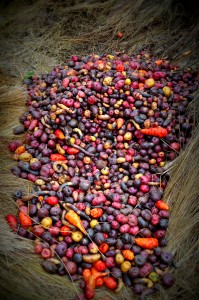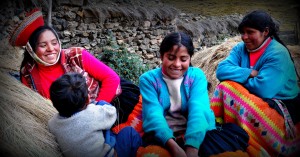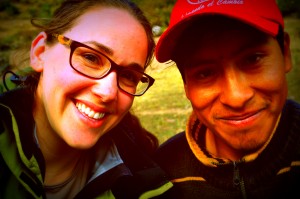 Fortunato ran across the Ollantaytambo town center to greet me in typical Peruvian fashion, with a kiss on the cheek. A huge smile filled his face as he expressed his relief in finding me (our plans had been less than concrete, yet worked out nonetheless – also in Peruvian fashion). Fortunato quickly became one of my favorite people in Peru as I listened to his stories, met his family, and enjoyed his great cooking. He exemplifies many of the young, educated men in the rural, Quechua communities around Cusco. He is passionate, knowledgeable, loving, and has big dreams. Our informal conversations, when my recorder, notebook and pen were tucked away in my backpack, were the most fruitful, providing me with not only insights about ECOAN but also the intricacies of life in Rumira Sondormayo, Fortunato’s community. But our conversations did not only revolve around my research, as Fortunato was extremely curious about me and my life in the United States. We talked about everything from my atheism to why I have no desire to have children. Both of these topics, and others, showed the great cultural divide between us (Fortunato is Catholic and has two children that he adores) and yet the conversations only served to bring us closer together as we learned about and came to appreciate our differences and similarities.
Fortunato ran across the Ollantaytambo town center to greet me in typical Peruvian fashion, with a kiss on the cheek. A huge smile filled his face as he expressed his relief in finding me (our plans had been less than concrete, yet worked out nonetheless – also in Peruvian fashion). Fortunato quickly became one of my favorite people in Peru as I listened to his stories, met his family, and enjoyed his great cooking. He exemplifies many of the young, educated men in the rural, Quechua communities around Cusco. He is passionate, knowledgeable, loving, and has big dreams. Our informal conversations, when my recorder, notebook and pen were tucked away in my backpack, were the most fruitful, providing me with not only insights about ECOAN but also the intricacies of life in Rumira Sondormayo, Fortunato’s community. But our conversations did not only revolve around my research, as Fortunato was extremely curious about me and my life in the United States. We talked about everything from my atheism to why I have no desire to have children. Both of these topics, and others, showed the great cultural divide between us (Fortunato is Catholic and has two children that he adores) and yet the conversations only served to bring us closer together as we learned about and came to appreciate our differences and similarities.
Where Isidro (my guide in Abra Malaga) was apprehensive, Fortunato was confident and this positively impacted my research. In a way, both of these young men’s attitudes reflected those of the entire community – people in Abra Malaga had little to no experience with outsiders and barely mumbled responses to my questions whereas those in Rumira Sondormayo smiled at me and readily answered my questions. That said, no one in either community had much to say about the ECOAN project. Despite the smiles that greeted me at Rumira Sondormayo, I was still an outsider. A conversation with Fortunato about the goals for my project confirmed my fears that people are inclined to tell me that the ECOAN project is “good” but nothing beyond that. That is basically how all of my interviews go; fortunately, I have been able to substantiate them with informal discussions and observation.
In fact, most of my time isn’t spent with a recorder and a list of questions but rather sitting quietly while observing some event, or more often, participating. For example, one day I helped Fortunato’s mother, Maria, sort potatoes. After harvesting, the potatoes are stacked in large piles, types separated by tall-grass. One pile can hold 20 types of potatoes, all in their own separate grass compartment. We sorted into several piles: large potatoes then seed potatoes, medium then another set of seed potatoes then small, tiny and tinier. I closely studied each potato to look for the growths perfect for seedlings while Maria tossed potatoes, seemingly without a second’s hesitation. My incredible slowness and the adorable puppy that I could not resist playing with probably made me not the best of helpers. I was simultaneously listening to Maria talk about past visitors, including Fortunato’s godmother (a PhD student and/or professor from Holland that studied medicinal plants). If nothing else, I was useful for my simple ability to listen and sympathize. Listening to people’s stories provided me with a rich foreground for my research – a background filled with other foreign visitors, changing climate, and family controversies.
One elderly man (a jokester who asked me if I was single numerous times — to which I replied I was married – which I’m not) interrupted me in the middle of the interview and said, “I have a question for you!” I laughed and prompted him to ask. He asked me why Abra Malaga receives firewood and Rumira Sondormayo does not. It was a good question. I told him I didn’t know ECOAN’s reasons exactly but that I imagined it was because Abra Malaga does not have eucalyptus farms like Rumira Sondormayo on account of their incredibly high altitude. He asked me other similar questions and I tried to give him my best responses. It made the interview a real conversation and, as a result, it was one of the best interviews I received. It made me think about my interview style and how I could improve it – giving room for the other person to ask questions is fantastic, though it hinges on the other person being interested/involved/bold enough to ask. I plan to incorporate this into my next set of interviews along with informal conversations about their life (family, livestock, etc.). I also now know how to say basic greetings in Quechua, which I hope to use to my advantage. Even so, the thing I really need is more time to build solid relationships.
At the very least, I managed to build a solid relationship with Fortunato. By the end of my stay, I was able to challenge him to  describe how he planned to encourage tourism in his community. The majority of the community wants to be more involved in tourism and they want ECOAN to help. I asked Fortunato how he expected ECOAN to help, pointing out that ECOAN does not have the capacity nor the resources to undertake a large publicity campaign, for example. Many rural communities look to tourism as the answer to their economic woes, but what does that really mean? I haven’t studied this enough to know the answer, but I do know that in order for tourism to be a success you need to have the demand. Tourism is similar to the handicrafts that rural communities around the world try to sell. Many NGOs have popped up to support this endeavor, but even if the grant money and the capacity are there, you still need a consumer who is interested in buying the product.
describe how he planned to encourage tourism in his community. The majority of the community wants to be more involved in tourism and they want ECOAN to help. I asked Fortunato how he expected ECOAN to help, pointing out that ECOAN does not have the capacity nor the resources to undertake a large publicity campaign, for example. Many rural communities look to tourism as the answer to their economic woes, but what does that really mean? I haven’t studied this enough to know the answer, but I do know that in order for tourism to be a success you need to have the demand. Tourism is similar to the handicrafts that rural communities around the world try to sell. Many NGOs have popped up to support this endeavor, but even if the grant money and the capacity are there, you still need a consumer who is interested in buying the product.
Despite my pessimistic questions, Fortunato answered readily, happily and logically. Like most of the men in these communities, he worked as a porter for the Inca Trail to Machu Picchu for many years (back-breaking labor in which you rely on tips for pay). As a result, he knows tourists. So, his answer was that before they could even begin to advertise to tourists, they needed facilities: bathrooms, buildings and beds. He was right. A majority of tourists, I imagine, are not keen to sleep on sheep hides and go to bathroom on the on barren slopes surrounding Rumira Sondormayo. Even with facilities, Rumira Sondormayo only offers a very specific type of tourism: cultural and environmental. And they are competing not only with hundreds of similar communities in the area, but also the main draws of Cusco – Machu Picchu and other ruins. Despite my pessimisms, I really hope that Fortunato’s dreams for development in his community are realized. He is on the right path (as far as I can tell) and if anyone has the passion and intelligence to make a change, it is he. My desire to learn, firsthand, about the challenges of “conservation and development” is why I am in Peru in the first place yet I am finding that three months will only allow me to scratch the surface.
